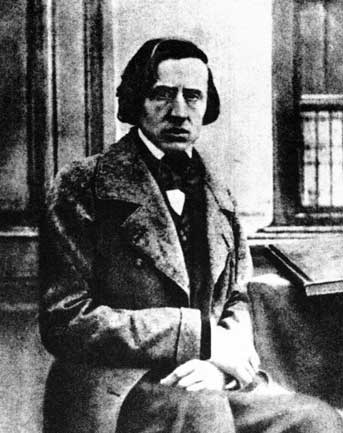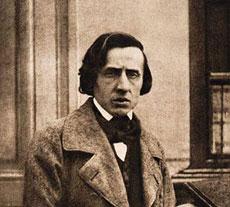‘Everyone With a Sensitive Heart Can Feel Chopin’
The headline is an apt observation made by Juilliard student Fei-Fei Dong of Hangzhou China. Many have attempted to pin down the source of composer Frederic Chopin’s enduring appeal; few have summarized it so well or so succinctly. Herewith our tribute to a giant in the 200th year of his birth.
The Life
Though some dispute the exact date of his birth, Polish-French composer and pianist Frédéric Chopin gave his own birthdate at March 1, 1810, and Poland is celebrating the composer’s bicentennial with a year of concerts, recitals and conferences. The country's parliament has declared 2010 the Year of Fryderyk Chopin. A Chopin Centre and renovated Chopin Museum will be inaugurated to honor the great Romantic composer, whose work is regarded as a Polish cultural treasure.The year will see around 1,300 Chopin concerts in locations ranging from northern Norway to Florida, listed on the dedicated website www.chopin2010.pl.
Poland expects an influx of visitors to the dozens of sites in the country where the composer lived and worked, particularly to the manor house in Zelazowa Wola where he was born. Now a museum, it has become a Chopin shrine. Warsaw is to have a new-look Chopin Museum. The Milan-based Migliore & Servetto company won the international competition for the design of the facility.
Chopin’s works for solo piano include about 61 mazurkas, 16 polonaises—inspired by his strong nationalist feeling—26 preludes, 27 études, 21 nocturnes, 20 waltzes, three sonatas, four ballades, four scherzos, four impromptus, and many individual pieces and 17 Polish songs.
The year also sees the 16th International Chopin Competition. Held every five years, it attracts musicians from all over the world.
Organized jointly with the Warsaw Philharmonic, a series of birthday concerts commenced on February 21 with a recital by Rafal Blechacz. The program will culminate with the Third International Chopinological Congress. According to the organizers, "This will be the third grand gathering of scholars from all over the world devoted to the person and the oeuvre of this great Pole, following congresses in 1949 and 1999. The main purpose of the third congress is to sum up eleven years of intense Chopinological research."
Frédéric's mother and French émigré father moved from Zelazowa Wola to Warsaw, some 30 miles away, in his infancy. All the family had artistic leanings, according to the Encyclopedia Britannica biography, and even in infancy Chopin was always strangely moved when listening to his mother or eldest sister playing the piano. By six he was already trying to reproduce what he heard or to make up new tunes. The following year he started piano lessons. He soon left his teacher behind, discovering for himself an original approach to the piano. Chopin found himself invited at an early age to play at private soirées, and at eight he made his first public appearance at a charity concert. Three years later he performed in the presence of the Russian tsar Alexander I, who was in Warsaw to open Parliament. At seven he wrote a Polonaise in G Minor, which was printed, and soon afterward a march of his appealed to the Russian grand duke Constantine, who had it scored for his military band to play on parade.
In March and October 1830 he presented his new works to the Warsaw public and then left Poland with the intention of visiting Germany and Italy for further study. The disturbed state of Poland after its revolt against Russian rule persuaded him to make his way to Paris.
In 1836 he met free-living novelist Aurore Dudevant, better known as George Sand; their liaison began in the summer of 1838. The couple, along with Sand's children, spent a harsh winter in Majorca, where Chopin's health plummeted and he was diagnosed with consumption (tuberculosis). Chopin settled in with Sand in France, composing steadily, although his increasing perfectionism slowed his output. By the mid-1840s, though, his health and romantic situation both had deteriorated. The affair ended in 1847 after, among other things, Sand had portrayed their relationship unflatteringly in her 1846 novel Lucrezia Floriani. Chopin then made an extended visit to the British Isles, but returned to Paris, where he died of tuberculosis in 1849.
Chopin’s body, without the heart, was buried at the cemetery of Père Lachaise in Paris. His heart was interred at the Church of the Holy Cross in Warsaw.
The last piano that Frederic Chopin composed on at the newly renovated Frederic Chopin Museum that was opened in Warsaw, Poland, on the 200th birthday of the famous composer, March 1, 2010.The Music: Three Views
‘One of the most significant and individual composers of the Romantic age’
James Reel, All Music Guide:
“Although a few major pianists, notably Glenn Gould, have dismissed his music as excessively ornamental and trivial, Frédéric Chopin has long been recognized as one of the most significant and individual composers of the Romantic age. The bulk of his reputation rests on small-scale works that in other hands would have been mere salon trifles: waltzes, nocturnes, preludes, mazurkas, and polonaises (the last-named two groups reflecting his fervent Polish nationalism). These works link poetically expressive melody and restless harmony to high technical demands. Even his etudes survive as highly appealing concert pieces by emphasizing musical as well as technical values.”
Arthur Rubinstein plays Chopin’s ‘Nocturne in F-sharp Major, Op. 15, No.2’ (from VAI DVD 4275, Arthur Rubinstein plays Chopin and Rachmaninov), Rubinstein, one of the most celebrated pianists of the 20th century, performs an all-Chopin concert in the intimate setting of his home. Filmed in 1950, Rubinstein plays and shares his perspectives on the music of Chopin. Showcase Symphony Orchestra, Alfred Wallenstein, conductor. This DVD comprises two programs previously-released by VAI: The Tribute to Chopin including the Scherzo in C-sharp minor, Nocturne in F-sharp, Mazurka in C-sharp and the Polonaise in A-flat. From the Festival of Music 1956 telecasts, Rubinstein performs the A-flat Polonaise and Rachmaninoff’s Rhapsody on a Theme of Paganini. The complete DVD is available at www.vaimusic.com‘The wonder is the way he conjured new sounds from the piano’
From Essentials of Music.com:Chopin's music helped to expand the technical and expressive range of the piano.
The music of Frédéric Chopin is, in many ways, a record of Chopin the pianist. All of his music is either for solo piano, or places the piano in an important role. As a performer, he was known for his improvisational ability, and his compositions are often the result of these performances.
The wonder of Chopin's music is the way he conjured new sounds from the piano. His pieces explore the full expressive range of the instrument, and he had the ability to create (sometimes in just a few lines of music) a kind of musical poetry. The freedom with which he played is reflected in his extensive use of tempo rubato. He also extended the harmonic language of the Romantic style; not by bold leaps to new chords and tonalities, but by subtle side trips that take his pieces to those new tonal areas. Finally, Chopin is remembered as one of the first nationalist composers, using the themes and dances of his native Poland as the sources for his pieces (especially the polonaises and mazurkas). In every way, Chopin was the quintessential "Romantic" composer, and Robert Schumann’s initial reaction to his music ("Hats off, gentlemen, a genius") was borne out in his short but spectacular career.
(http://www.essentialsofmusic.com/composer/chopin.html)
‘I live with Chopin in my soul, all the time’: Valentina Ogoshina on Chopin, and performing his Étude Op. 10, No. 3‘Cannons Hidden Amid Flowers’
From Voice of America News
(http://www1.voanews.com/english/news/american-life/Centuries-Later-Chopin-Still-Inspires-85515552.html)Concert pianist Kimball Gallagher, 29, says he first fell in love with Chopin's, "Revolutionary Etude" as a 12 year old and practiced it at his family's piano every day for over a year. That inspired a lifelong love of the composer, a passion he's now sharing with many others as associate producer for "Chopin 200," a free, five-day event in New York's Winter Garden. Inside the giant marble mall in the World Financial Center, more than 150 pianists are scheduled to play 200 hours of Chopin on four pianos.
"I'm very excited about it," says Gallagher. But the musical feast isn't just for Chopin-connoisseurs. It's also intended for anyone who's unacquainted with Chopin's extraordinary body of work.
"We certainly hope there'll be a lot of people who'll be surprised when they are walking through and say 'What is that?' and they are going to come and sit down and be intrigued, and then realize that even though he was born 200 years ago he's still very much alive," says Gallagher.
Frederic Chopin in 1849Born in Poland in 1810 to cultured middle-class parents, Chopin was recognized early on as a musical prodigy. He was influenced by the aristocratic families who hosted him and nurtured his development as a composer and musician.
"Grand" and "intimate" are words often used to describe Chopin's music. Its refinement, complexity, simplicity and wide emotional range made the music innovative in its time and it continues to seem modern even today.
Chopin's appeal is truly universal, says Veda Kaplinsky, head of the piano department at the famed Juilliard School of Music, where Chopin is a staple in auditions, classrooms and performances.
"He is one of those very rare composers that was able to combine an incredible, almost unfathomable emotional depth and intensity with an organic understanding of the keyboard that makes paying his pieces extremely satisfying for musicians and listeners alike," says Kaplinsky. "His music is extremely accessible in that the melodies are absolutely beautiful and the harmonic treatment is such that he really touches a very inner chord in the listener's heart."
Cast of Frederic Chopin’s hand
"Take the A minor Sonata, an amazing piece of music which is a microcosm of all of life in two minutes, it's incredible," she says. "There is a one-two rhythm underneath but it's never strict. It's always manipulated, and the way it is manipulated makes you cry, makes you laugh, makes you want to dance, makes you do all kinds of things."
Weakened by tuberculosis during much of his short life, Chopin died at 39. But he brought unmatched vigor and tempestuousness, not only to his music, but also to his love affairs, most notably with the free-thinking novelist George Sand, a woman.
Sergei Rachmaninoff plays Chopin’s Nocturne Op. 9, No. 2Robert Schumann, a fellow composer and contemporary admirer of Chopin's, once said he heard "cannons hidden amid flowers" in Chopin's piano works.
Veda Kaplinsky often hears it in Chopin's ballades, a musical form she says he both invented and perfected.
"It starts out as a fairy tale, a 'once upon a time' kind of thing and it evolves into something very dramatic and very tragic," she says. "They were modeled after literary pieces and in terms of their musical form, they are based on a theme that keeps recurring and every time it recurs it is more dramatic and more tragic and usually leads to a very tumultuous conclusion."
Some of Chopin's best-known music is associated with personal tragedy, such as the "Funeral March" that forms part of his B Minor Sonata. It was played at his own funeral in Paris in 1849.
(photo of Fei-Fei Dong: VOA-A. Phillips)
Chopin lived most of his adult life in Paris and was the toast of the cultural capital. But he remained a staunch Polish nationalist, angered by the loss of his country's independence following the Napoleonic wars. His "Heroic" Polonaise evokes the color and struggle of military battle, and established nationalist music as a genre.
But it is the dreamy and sensuous "Nocturnes" that most inspire Juilliard's Fei-Fei Dong of Hangzhou China. "My teacher always told me 'when you play this piece, every note means something and you have to love every note,' and I think it's just so beautiful," she says.
"So I think everyone with a sensitive heart can feel Chopin. Chopin's music is full of love. Chopin's music also, it's very simple. That's why people love Chopin also. You can't impose too much artificial things to it. It has to flow out naturally. It's like born out of your body."
Founder/Publisher/Editor: David McGee
Contributing Editors: Billy Altman, Laura Fissinger, Christopher Hill, Derk Richardson
Logo Design: John Mendelsohn (www.johnmendelsohn.com)
Website Design: Kieran McGee (www.kieranmcgee.com)
Staff Photographers: Audrey Harrod (Louisville, KY; www.flickr.com/audreyharrod), Alicia Zappier (New York)
E-mail: [email protected]
Mailing Address: David McGee, 201 W. 85 St.—5B, New York, NY 10024







